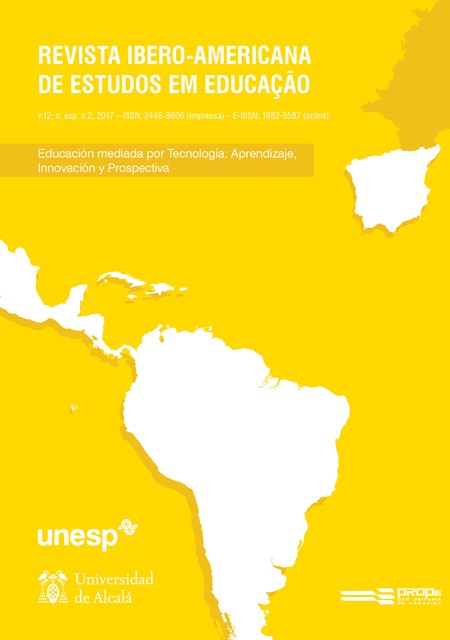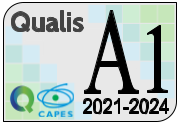Activities Based on Wiki Platform for Engineering Higher Education: Students' Point of View
DOI:
https://doi.org/10.21723/riaee.v12.n.esp.2.10300Palavras-chave:
Engineering education. Wiki-based activities. Collaboration on wiki platform.Resumo
The fast evolution of Information and Communication Technology (ICT) introduced a new generation of learners that have been adopted mobile devices and Web 2.0 technologies to get information and communicate. The Web 2.0-based tools, such as blogs, wikis, Facebook, Instagram, etc, offer huge possibilities for collaboration. In this way, the main purpose of this research was plan an activity on wiki platform for Reinforced Concrete discipline in Civil Engineering course and answer the questions: (1) How should collaboration be effectively measured on wiki platform? (2) What is the students' point of view about using wiki platform for a collaboration activity? Wikispaces Classroom platform was chosen for the project because it is a free social writing platform, suitable for collaborative learning. Furthermore it works on modern browsers, tablets, and smart phone. A total of 167 students of Civil Engineering course were monitored on Wikispaces® platform. All students’ actions were analyzed and classified as low, medium or high level of collaboration. At the end of the project 111 students answered a questionnaire and 10 students participated of an informal interview where they expressed their opinion about the platform, the activities and the relationship with online peers. A descriptive statistical analysis of the data collected from the platform and the questionnaires answered by the students was performed. The results indicated that wiki platform is an important way to develop innovative activities and tasks for the purpose of to improve skills of engineering students such as: writing communication, organization, collaboration and critical thinking.
Downloads
Referências
ABREU, P. et al. Effect of the usage of wikis on an educational context. Computer Aplications in Engineering Education, v. 20, p. 646-65, 2012. <http://dx.doi.org/10.1002/cae.20434>.
ANANIADOU, K.; CLARO, M. 21st Century skills and competences for new millennium learners in OECD countries. Organisation for Economic Cooperation and Development. EDU Working paper n. 41. Retrieved March 12, 2017 from: <http://www.oecd.org/officialdocuments/publicdisplaydocumentpdf/?cote=EDU/WKP(2009)20&doclanguage=en>.
CICCONI, M. Vygotsky meets technology: A reinvention of collaboration in the early childhood mathematics classroom. Early Childhood Educ J, v. 42, p. 57-65, 2014. <http://dx.doi.org/10.1007/s10643-013-0582-9>.
EBNER, M.; KICKMEIER-RUST, M.; HOLZINGER, A. Utilizing wiki-systems in higher education classes: a chance for universal access? Universal Access in the Information Society, v. 7, N. 4, p. 199-207, 2008. <http://dx.doi.org/10.1007/s10209-008-0115-2>.
GOMES, R.; SOUSA, L. Teaching and learning through wikis in higher education. International Journal of Information and Education Technology, v. 3, n. 6, p. 628-633, 2013. <http://dx.doi.org/10.7763/IJIET.2013.V3.350>.
GUERRERO, M. C. M. de; VILLAMIL, O. S. Activating the ZPD: Mutual scaffolding in L2 peer revision. The Modern Language Journal, v. 84, p. 51-68, 2000. <http://dx.doi.org/10.1111/0026-7902.00052>.
HADJERROUIT, S. Wiki as a collaborative writing tool in teacher education: Evaluation and suggestions for effective use. Computers in Human Behavior, v. 32, p. 301-312, 2014. <http://dx.doi.org/10.1016/j.chb.2013.07.004>.
JAMES, R. ICT’s participatory potential in higher education collaborations: Reality or just talk. British Journal of Educational Technology, v. 45, n. 4, p. 557–570, 2014. <http://dx.doi.org/10.1111/bjet.12060>.
KIM, N. Critical thinking in wikibook creation with enhanced and minimal scaffolds. Educational Technology Research and Development, v. 63, p. 5–33, 2015. <http://dx.doi.org/10.1007/s11423-014-9361-6>.
LI, M.; ZHU, W. Patterns of computer-mediated interaction in small writing groups using wikis. Computer Assisted Language Learning, v. 26, n. 1, p. 61-82, 2013. <http://dx.doi.org/10.1080/09588221.2011.631142>.
MAY, D. et al. What students use - results of a survey on media use among engineering students. In: Frontiers in Education Conference, 2014, Madrid, Spain. IEEE Frontiers in Education Conference Proceedings, 2014. <http://dx.doi.org/10.1109/FIE.2014.7044002>.
National Research Council. Education for life and work: Developing transferable knowledge and skills in the 21st century. Committee on Defining Deeper Learning and 21st Century Skills, J.W. Pellegrino and M.L. Hilton, Editors. Washington, DC: The National Academies Press, 2012.
PFEIL, U.; ZAPHIRIS, P.; ANG, C. S. Cultural differences in collaborative authoring of Wikipedi". Journal of Computer-Mediated Communication, v. 12, n. 1, p. 88-113, 2006.
SULISWORO, D. Designing the online collaborative learning using the Wikispaces. International Journal of Emerging Technologies in Learning, v. 7, n. 1, p. 58-61, 2012.
The Royal Academy of Engineering. Educating engineers for the 21st century. London, UK: The Royal Academy of Engineering Press, 2007.
The Royal Academy of Engineering. Engineering graduates for industry. London, UK: The Royal Academy of Engineering Press, 2010.
University of Delaware. Wikis in higher education. Newark, DE: University of Delaware, IT-User Services, 2008. Retrieved March 12, 2017 from: <http://udel.edu/~mathieu/wiki/resources/2008-5-3_Wikis_in_Higher_Education_UD.pdf>.
VYGOTSKY, L. S. Mind and society: The development of higher mental processes. Cambridge: MA, Harvard University Press, 1978.
WANG, Y.-C. Using wikis to facilitate interaction and collaboration among EFL learners: A social constructivist approach to language teaching. System, v. 42, p. 383–390, 2014. <http://dx.doi.org/10.1016/j.system.2014.01.007>.
WAYCOTT, J. et al. Making students’ work visible on the social web: A blessing or a curse? Computers & Education Journal, v. 68, p. 86-95, 2013. <http://dx.doi.org/10.1016/j.compedu.2013.04.026>
Wiki-Wiki-Web® Website. Cunningham, Ward, 1995. Retrieved April 2, 2017 from <http://c2.com/cgi/wiki?WelcomeVisitors>.
Downloads
Publicado
Como Citar
Edição
Seção
Licença
Manuscritos aceitos e publicados são de propriedade dos autores com gestão da Ibero-American Journal of Studies in Education. É proibida a submissão total ou parcial do manuscrito a qualquer outro periódico. A responsabilidade pelo conteúdo dos artigos é exclusiva dos autores. A tradução para outro idioma é proibida sem a permissão por escrito do Editor ouvido pelo Comitê Editorial Científico.








